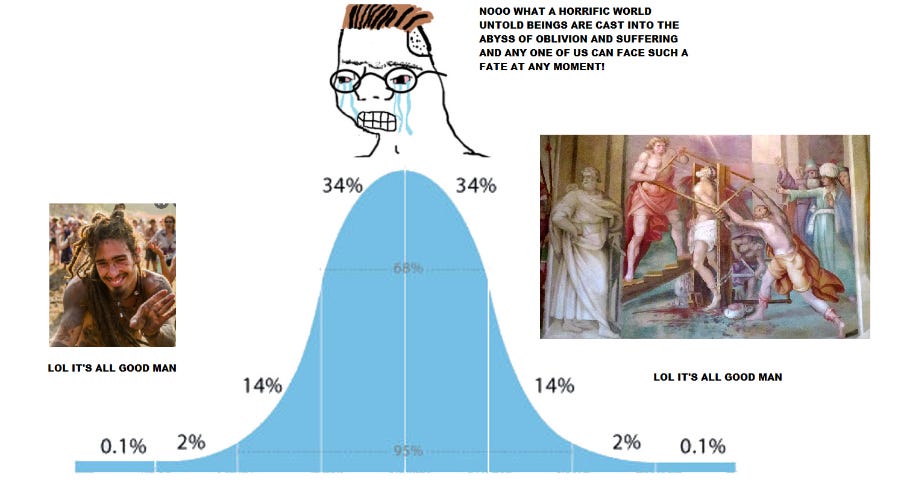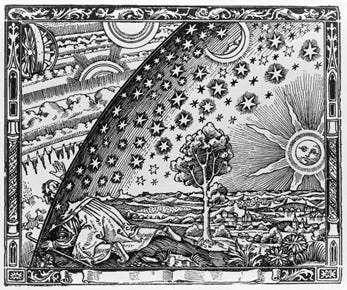“There's a road that leads to glory
Through a valley far away,
Nobody else can walk it for you,
They can only point the way.”
In this Twitter thread I described a developmental pattern: you must learn to perform social roles and then unlearn those roles to become fully yourself. If you attempt to short circuit this process by not performing these roles in the first place, you end up stunted and maladapted.
This pattern is everywhere. To give an apocryphal example: Bruce Lee found that he had to teach his students to unlearn their previous martial arts training. But this did not mean that untrained students were better than martial artists at receiving his teaching.
This is the systematic valley. It is the developmental period anyone must pass through on the way to mastery. This is the period of trying, and failing, to reduce any given expertise to a clearly articulable, formal and technical system. You must fully and deeply learn any system in order to transcend it.
C.S. Lewis wrote about the importance of prayer and good works in the context of salvation by grace alone: you must try as hard as you can in order to appreciate the futility of your efforts. There are various Buddhist schools of thought that teach “you are already enlightened.” What then, is the point of all of this meditation? In order to appreciate how pointless it was - because you were already enlightened.
Language is a liar
Passing through this valley is what makes the difference between the thought-terminating clichés of the lazy and unambitious and deep wisdom coming from a master – even if, superficially, they express the same sentiments. They are not the same – one has passed through the valley, applying their full intellect, power and all the legacy of technique and tradition to a problem, and the other is making excuses to not even try.
Perhaps you have heard some neo-Advaitic platitudes or casual affirmations of life’s goodness and the transiency of evil: “It’s all one, man.” “It’s all good, man.” Imagine an ordinary person saying this to you when you were suffering extreme grief and hardship, and now imagine a saint saying the same thing in the face of torture and death. The truth is not only in the words, but in the entire stance and experience of the person uttering them.[1]
The exhaustion of reason is the beginning of wisdom
Try to give a comprehensive, consistent and universal account of ethics, epistemology or aesthetics. You will fail, and after failing you might do one of 3 things: engage in a fundamentalist, dogmatic defense of a partial answer; succumb to nihilist despair; or realize that your reason and language were totally inadequate for the problem and move on. Because what you really encountered was not the absence of truth, beauty, or moral standards in the world but your own failure to give a coherent description of them.
Reason is a tyrannical demi-urge that excels at coming up with reasons (!) why its claims should take priority over all others. It tells us that beyond its boundaries there is only superstition, impulse, and savagery. But reason arises from something more fundamental. We can begin to see what this fundamental thing is when we attempt to give additional evidence to things which seem self-evident – proving or explaining why 2 and 2 is 4. Reason seeks and fails to provide its own justification.
If we get past this, we can accept that judgment does, in fact have an objective basis but one that defies systematic articulation. The most important areas of human discernment cannot be reduced to a definitive, universal list of rules and their principled exceptions. We cannot escape the burden of judgment by offloading all of our cognitive efforts onto formal rules, no matter how solid they might seem.
But reason must be exhausted – you cannot shrink from it by retreating into a childish world of delusional wish fulfillment fantasy. In seeking an encounter with the more-than-rational which re-enchants and gives meaning to the world again, many make the error of idolizing the sub-rational, of thinking that whatever they believe in or desire from the world must be true. This is common in popular occultism and the New Age.
The Wayless Way
When you pass through this valley and realize that all attempts at describing the basis of discernment fail, and yet discernment remains, you begin to enter into the wordless, formless way of mastery. You can make deeply correct decisions about your area of expertise without being able to reduce those decisions to rules of thumb – or even give reasons for them. You cannot bypass this process by simply abandoning your efforts to systematize the world around you. You must push through to the other side. You must fully appreciate the futility of your own efforts.
Like all rules (and meta-rules) there are exceptions – and one exception is the genius, who is able to jump directly from the pre-systematic mode to the post-systematic mode. Such people are freaks of nature, and not good models to emulate, but you also may have moments of genius that come to you – moments of discernment that defy or pre-empt reason.
[1] If this statement bears a strong resemblance to the radical IDPOL of SJWs, know that they are not even wrong, just insane.




Found you on Twitter, really enjoying your posts. I think what you said in your Twitter thread about the necessity of first adopting artificial roles placed on you by society and parents before properly transcending them has real resonance for our society as a whole. So much of current philosophy and politics is premised on the notion of a rebellion against tradition: things like rejecting traditional gender roles, "decolonizing" the Western Canon, complicating long-standing historical narratives, even deconstructing notions like "truth" or "objectivity" themselves. The theorists who originally spawned these postmodern ideas did not grow up with them. They were well-trained in the classics, in the Canon, in history. Their teachers still believed in things like "Truth"; some of them may still have even believed in God. And so those rebels first had to go through the "systemic valley" you are describing before reaching their (undeniable) insights. There was actually a real, living tradition against which those early theorists could rebel, against which their theories could be tested and formed into their mature shape.
Today, this philosophy of rebellion *is* the tradition young intellectuals grow up in. But rebellion is no basis for a tradition; traditions require order, lineage, structure. And so we, at least as an intellectual culture, are the equivalent of the spoiled, narcissistic "children of hippies" that you describe in your Twitter thread. We got to the rebellion stage without even knowing what we were rebelling against. We never passed through the "systemic valley" of having to really learn a tradition. We think that our every fleeting fantasy or poorly conceived idea is valid and worthy of intellectual respect (see, e.g., "abolish the police"). I think this is at least part of the origin of the Woke ideology that is wreaking so much havoc right now in our intellectual, political, and moral culture.
Anyways, thanks for your post. Keep them coming!